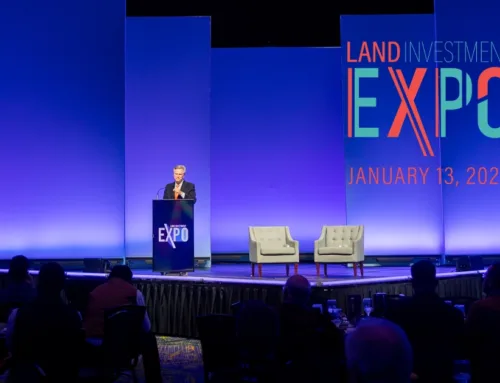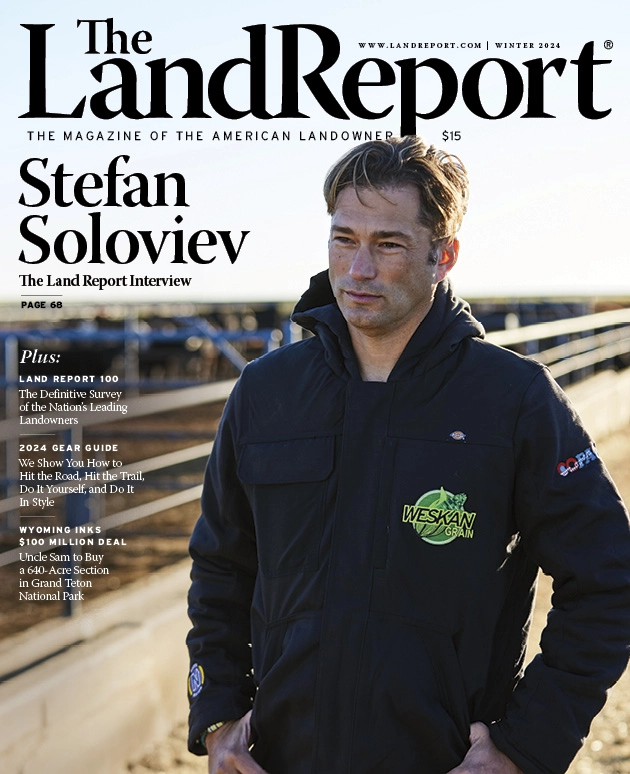Frey Farms CEO Sarah Frey Gets Candid
Frey Farms CEO Sarah Frey Gets Candid

LR_Sarah-Frey
Sarah Frey is best known as CEO of Frey Farms, the largest supplier of pumpkins in the US, with growing operations across in seven states.
All it took was a moment for Sarah Frey’s life to change completely. In 1992, as a teen, she had an epiphany: rather than carrying through with her original plan to flee her family’s 80-acre Southern Illinois farm, she would instead save it.
In an intimate, unfiltered keynote speech shared at the 2023 Land Investment Expo, Frey walked attendees through that teenage plan shift, and how her genuine connection to the land – plus a tenacious business sense – spurred her agricultural success.
Thinking Like an Entrepreneur
Today, Frey, 46, is best known as CEO of Frey Farms, the largest supplier of pumpkins in the US, with growing operations across roughly 15,000 acres in seven states. She’s also an author. Her memoir, The Growing Season: How I Built a New Life – and Saved an American Farm, was published by Ballantine Books in 2020.
But her beginnings were humbler. From the conference’s main stage, Frey shared that she and her siblings grew up eating only what they hunted or grew themselves. Her mother sold watermelons to area markets to help make ends meet. But the small family farm was struggling, and the family considered selling it.
Instead, Frey set out on a mission to not only keep the land in her family, but also turn it into a thriving business.
At just 16, she took over her mother’s melon business and grew it. She added pumpkins to diversify the farm’s offerings and extend the family’s growing season. She snagged deals supplying produce to several local Walmarts and other area retailers.
But Frey’s real break came when she noticed a new Walmart distribution center being built nearby. Even before the facility had officially opened, Frey marched right in – dressed, she shared, in jeans, a ball cap, and a dirty t-shirt. She was ushered over to the produce buyer and walked out with a deal to deliver two loads of cantaloupes and three loads of watermelons to the distribution center weekly.
But, as Frey candidly told the crowd, there was a problem: it wasn’t until after she walked out of the meeting that she realized the buyer had meant semi loads of melons. At that time, Frey was still operating with a pickup truck and towable farm trailer. She had neither semis nor a commercial driver’s license.
Frey immediately called upon an older brother for help, and together, over time, Frey and her siblings built Frey Farms into the thriving business it is today. Currently, Frey supplies not only millions of pounds of watermelons, pumpkins, squash, and sweet corn across the US, but also thriving, innovative lines of juices, seeds, and other secondary products that allow the company to glean profit even from produce too “ugly” for traditional market sales.
“I had to think like an entrepreneur,” Frey told the audience. “It’s the same question all entrepreneurs face: ‘How to do more with less.’ In my case, in the beginning, it was how to do more with just 80 acres.”
Connecting with Consumers
Pivoting to address the title of her talk – “How to See Past Life’s Imperfections and Find the Good Even in Dark Times” – Frey fast-forwarded in her business journey to discuss an eye-opening discovery she made during the COVID-19 pandemic.
Facing the unwelcome prospect of watching millions of dollars’ worth of melons rot in fields as the pandemic disrupted traditional produce supply chains, Frey found herself at home, in the kitchen, making panicked phone calls as she tried to navigate a plan. Witnessing this were Frey’s two teen sons, who were themselves trying to navigate online learning during COVID school closures.
When her sons asked how they could help, Frey sarcastically told them they could sell some melons. Not picking up on her tone, the two set into action with a plan to do just that.
Despite Frey’s skepticism, her two sons successfully sold two semi loads of Florida watermelons in just a few hours during a drive-thru market they organized at the family’s farm headquarters in rural Illinois.
With awe in her voice, Frey shared her astonishment at how that day unfolded: “There were over a thousand cars lined up to get to our farm to buy a watermelon from the kids,” she said.
When she asked her sons how they did it, they said simply: “We put it on Facebook.”
It was another epiphany moment for Frey, who said the experience taught her about the power of connecting directly with consumers.
“The kids taught me a very valuable lesson,” she said. “While we might sell to retailers, that day showed me that we also need to talk directly to consumers. Since then, our engagement process for our company has been very different. We’re embracing the fact that people want to feel connected to farms. They want to feel as though they have a stake in how their food is grown.”
Respecting the Human-Land Connection
Frey closed out her reflections with a direct entreaty to those in the audience. She asked them to “always remember in [their] land deals, there are people – and therefore emotions – involved.”
She urged would-be buyers and brokers of land to be sensitive, always, to the stories and memories of the families selling the property.
“Remember the human aspect of our relationship to the land,” she pleaded. “My connection to the land was what motivated me, as a teen, to make a life-changing decision to stay on our farm.”
She urged attendees to respect the close ties people build to their farms, even in the midst of their business dealings. “My understanding and sensitivity to those connections as we’ve grown our business has oftentimes been the reason why I was given the opportunity to purchase a piece of land over someone else,” she shared.





